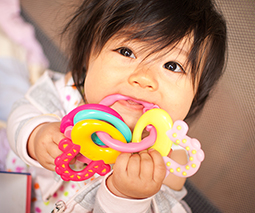Children’s tummy troubles – constipation

Tummy troubles in children can be very hard to diagnose – especially if they’re not old enough to tell you what’s going on. What can you do if you suspect that things aren’t moving along as well as they should be?
We’ve teamed up with Children’s Panadol to provide you with lots of quick and helpful information covering many aspects of children’s health and development. We hope you’ll find them a great resource as you take care of your family every day.
How do I tell if my child is constipated?
Quite a lot of babies look like they are concentrating hard or get very restless when passing a bowel motion. This is normal, providing the bowel motions are soft and there is no blood. Constipation is when bowel motions are very firm and look like little pebbles. Your older child may mention that it hurts to go to the toilet, complain of tummy pains or cramps, or (for toilet trained children) soil their underwear.
Making changes to your child’s diet should always be the first step — before giving medicines or suppositories. Discuss this with your Child Health Nurse.
For babies not yet on solid foods
If your baby is breastfed, continue to breastfeed them regularly. Fortunately, breastfed babies rarely become constipated.
If your baby is bottlefed, give boiled water cooled to room temperature between feeds – 30 ml for a young baby, more for an older baby. Check the strength of the formula your baby is drinking. Are you making it up correctly? Always put the water in the bottle first, and then add powder. Don’t pack down the formula in the scoop.
To relieve constipation, it might be helpful to put some oil on your hand and gently massage your baby’s tummy in a clockwise direction. Also, at change time, leave the nappy off for a few minutes, and do ‘bicycle’ motions with the baby’s legs, gently moving their legs backwards and forwards as if they were pushing the pedals of a bike.
If your baby is on solid foods
Increase the amount of fruit (such as stewed apples, pears and prune pulp) and vegetables (such as spinach and carrot). Cook this yourself if possible, as they will have more roughage than commercial baby foods. If your baby is eating baby cereal, decrease the amount for a few days. If your baby is over six months, make sure you use mixed grain cereal.
Older children
Give pieces of cooked vegetables or soft fruit. Give extra water and/or diluted fruit juice (half water). Encourage your child to go to the toilet regularly.
When to seek help
If you have tried the above suggestions for two to three days and there has been no soft bowel action, see your Child Health Nurse. If there is blood in your baby’s motion, see your family doctor.
This is an excerpt from The First Five Years, which is a handy and easy to navigate book, specifically developed to help parents. It contains a comprehensive collection of practical parenting information and useful tips for your child’s first five years. If you’ve ever wanted a quick guide to refer to in the middle of the night, or to help you decide when it’s time to see a doctor, this is a resource which will help you on your way. You can view it online or download it for free at The First Five Years.
(This is a sponsored post for Children’s Panadol)









